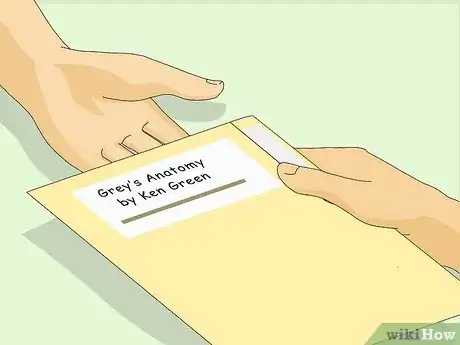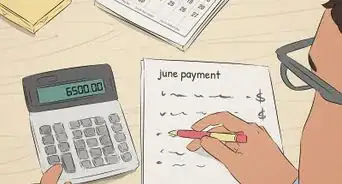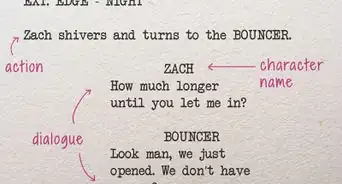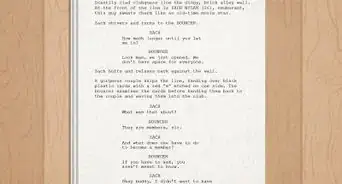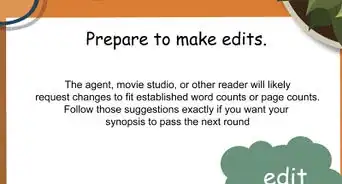This article was co-authored by Lucy V. Hay. Lucy V. Hay is an author, script editor and blogger who helps other writers through writing workshops, courses, and her blog Bang2Write. Lucy is the producer of two British thrillers and her debut crime novel, The Other Twin, is currently being adapted for the screen by Free@Last TV, makers of the Emmy-nominated Agatha Raisin.
This article has been viewed 107,002 times.
If you are passionate about story telling and television, then becoming a television writer may be for you. Television writers take the idea of a good story and shape it into an ongoing show that can draw in millions of viewers and run for numerous seasons. Writing for TV can be rewarding and exciting but breaking into the role of a television writer can take some time. By making connections, educating yourself, and creating a writing sample, becoming a TV writer is an attainable goal.
Steps
Obtaining an Education and Experience
-
1Major in entertainment writing. Look for colleges that offer writing degrees in screenwriting, film and television, or cinema and media production. TV writing is a specific type of writing and majoring in English or creative writing may be too broad. Be specific when choosing a writing program and make sure it includes classes specific to television production.[1]
- Film classes will help you understand characters, plot, and what translates well from the page to the screen. These classes will also give you an understanding of how films are made.
- Theater classes will give you an in depth look at working with actors on a script. These classes often require you to work with others and teach you how to work within a team. This will help prepare you for the larger project of TV writing.
- Television writing and production classes will be some of the most beneficial you can take. These classes will cover how to create scripts, what to expect in your job search, and career options.
-
2Take Writing for TV classes. You do not have to seek a degree to take these classes. Classes are offered online or in person, depending on where you are. Look in your area for TV writing classes sponsored by colleges, writing groups, or media companies. If you live in an area without access to in person classes, online classes are just as beneficial. Either option will allow you to meet new people who share your interest and make connections for the future.[2]Advertisement
-
3Read books about TV writing. Reference books will help you understand formatting as well as the creative aspect of TV writing. The Screenwriter's Bible by David Trottier or Crafty TV: Thinking Inside the Box by Alex Epstein are good books to start with. TV scripts are not formatted the same way as books or essays so researching is essential. [3]
-
4Study TV shows. Watch current TV shows with the purpose of educating yourself. Ask yourself what in the writing makes the show work.[4]
- How does the dialogue convey (or not) what the characters are trying to communicate?
- What role does non-verbal communication play in the show?
- How is the plot moving forward in this specific show as well as the rest of the season?
- How does the writing convey character development?
-
5Research screenwriters you admire. Use the Internet to find out who writes the shows you enjoy and research them. Watch or read interviews with screenwriters to find out how their career began and grew.
- If comedy is an area that interests you, Carol Leifer has written for Saturday Night Live, Seinfeld, and Devious Maids among other shows. She describes her experiences in her memoirs How to Succeed in Business Without Really Crying: Lessons From A Life in Comedy as well as in numerous interviews. [5]
- If you are a fan of Grey's Anatomy, Scandal, or How to Get Away With Murder, Shonda Rhimes has given several interviews discussing her career. She discusses her transition from film to television and often has advice for aspiring writers.
Writing Your Scripts
-
1Choose a network TV show you love to watch. Writing for a show and characters you are connected to will come across as more authentic than writing for a show just because it is popular. Do not write an original show idea. Show executives want to know if you can write in a preexisting world without drastically changing the show's dynamic or losing your unique voice. An established show is better than a brand new one since it will likely still be on the air when your script is ready to send out.[6]EXPERT TIPLucy V. Hay is an author, script editor and blogger who helps other writers through writing workshops, courses, and her blog Bang2Write. Lucy is the producer of two British thrillers and her debut crime novel, The Other Twin, is currently being adapted for the screen by Free@Last TV, makers of the Emmy-nominated Agatha Raisin.Professional Writer

 Lucy V. Hay
Lucy V. Hay
Professional WriterWrite an original script to become a screenwriter in the UK. Screenwriter and author Lucy Hay says: "In the UK, we don't look at trial scripts for existing shows. You have to write an original script, then get that in front of producers or networks. The networks may accept scripts any time, or they may have specific times where they call for submissions. The BBC writers room, for instance, accepts scripts at certain times throughout the year, and if your script has promise, they invite you to their various workshop days."
-
2Write a typical episode. This is not the time to drastically change the path of the show or showcase your new ideas. Stay true to the characters and storyline to prove that you can work within the established world of the show.
- Think about the storyline the show revolves around. If it is a mystery, do not solve the mystery in your episode. Similarly do not write an episode in which two characters finally become a couple if the show revolves around their romantic tension. It is also best to not kill off any characters in your spec script.
- Do not revisit or rewrite the show's history. You should keep your script within the confines of present day for the show. Your script should be free of flashbacks and mythology.
-
3Refine your writing. Edit your script, then edit it again. Watch the TV show you are writing an episode for and then go back to your script to make sure the writing stays true to the show. Is the dialogue believable for the show? Are your stage directions realistic within the confines of the series?
-
4Seek out editors. Family and friends are not ideal as they are often too close to you to be honest. Look for writer's groups, either online or in person, to exchange ideas and editing services with. These groups will help you hone your craft. They will also help you learn to accept rejection gracefully.
-
5Begin a second script. You will need at least two speculative (spec) scripts to break into the entertainment writing business. For television this will be two episodic screenplays of a TV show. This is how you will show executives and showrunners your writing ability and it is essentially your resume. You also want to make sure you have one ready to send in immediately if it is requested.[7]
Landing a Job
-
1Get an agent. An agent can help get your script into the right hands. Agents will list on their website specific instructions on how to submit your writing. The Writer's Guild of America is a reputable resource for finding agencies.[8]
- Almost all agents will require a query letter. This is a letter in which you sell your writing and yourself to the agent. Some require a specific format so check their website. All are looking for something that stands out so make sure your letter highlights the best parts of you and your writing.
- An agent shouldn't charge upfront to represent you. Most agents' fees are 10-12 percent after they broker your deal. If an agent asks you to pay a fee just for representation, move on to another agency.
-
2Send your script to TV showrunners and executive producers. You can look up information online about how to submit your script to them as they have specific, individual instructions. Many do not accept scripts, depending on legal issues with their current shows. The ones that will accept them usually have instructions on their company site for submitting episode manuscripts.[9]
-
3Apply for a job as an assistant. Becoming a writer's or producer's assistant is an excellent way to get your foot in the door of TV writing. You will not make much money, but you will be exposed to a TV show from the off camera point of view. This will allow you to read scripts, see how writers and producers work in real time, and make numerous connections within the industry. Check out the job opportunities section on the home page of the production company you are interested in joining. [10]EXPERT TIPLucy V. Hay is an author, script editor and blogger who helps other writers through writing workshops, courses, and her blog Bang2Write. Lucy is the producer of two British thrillers and her debut crime novel, The Other Twin, is currently being adapted for the screen by Free@Last TV, makers of the Emmy-nominated Agatha Raisin.Professional Writer

 Lucy V. Hay
Lucy V. Hay
Professional WriterIf you want to write for TV in America, apply for a job as a staff writer in a writer's room. Author and screenwriter Lucy Hay says: "In America, usually there's a show runner, and all of the staff writers work under that person. Usually, you get those jobs by writing trial scripts for various shows, and you send them in to the different networks."
-
4Network as often as possible. Search online for workshops, conventions, or meet and greets in your field. Join media groups online and follow them on social media. The more connections you make, the better your chance of getting a foot in the door.
Community Q&A
-
QuestionHow much can TV writers make?
 Community AnswerDepending on how well the show does, quite a lot. On average shows it ranges from about $65,000 to $105,000 per season.
Community AnswerDepending on how well the show does, quite a lot. On average shows it ranges from about $65,000 to $105,000 per season. -
QuestionI'm 12 years old and really passionate about writing. I was wondering how would I get started?
 Community AnswerEnter your work into contests and see if any of it gets noticed. In the meantime, do well in school and pay extra attention to writing and English class. When you are older you can specialize your writing and find a college for it.
Community AnswerEnter your work into contests and see if any of it gets noticed. In the meantime, do well in school and pay extra attention to writing and English class. When you are older you can specialize your writing and find a college for it.
References
- ↑ http://getinmedia.com/articles/film-tv-careers/how-land-your-first-tv-writing-job
- ↑ http://getinmedia.com/articles/film-tv-careers/how-land-your-first-tv-writing-job
- ↑ http://getinmedia.com/articles/film-tv-careers/how-land-your-first-tv-writing-job
- ↑ http://getinmedia.com/articles/film-tv-careers/how-land-your-first-tv-writing-job
- ↑ https://www.forbes.com/sites/lizadonnelly/2014/07/11/funny-women-an-interview-with-comedian-and-television-writer-carol-leifer/#1561acfd2784
- ↑ https://www.writersstore.com/breaking-into-television-writing/
- ↑ https://www.writersstore.com/breaking-into-television-writing/
- ↑ http://getinmedia.com/articles/film-tv-careers/how-land-your-first-tv-writing-job
- ↑ http://work.chron.com/become-writer-tv-show-22544.html
About This Article
If you want to become a TV writer, start by staying updated on what’s on TV right now so you can get a sense of what’s popular. As you watch, take notes on the dialog to get a feel for how it flows naturally, and to see which non-verbal actions work best. For example, if you’re writing comedy, it’s often the eye-rolling, pulling funny faces, or odd walks, that convey the character’s real meaning, instead of spoken words. When you're ready to write, try reading reference books like The Screenwriter’s Bible, taking TV writing classes online, and maybe joining a screenwriting club so you can learn screenwriters' terminology and techniques. For more tips, including how to nail your first TV writing gig, read on!











